
The commandant of the Marine Corps (CMC) is normally the highest-ranking officer in the United States Marine Corps. It is a four-star general position and a member of the Joint Chiefs of Staff. The CMC reports directly to the secretary of the Navy and is responsible for ensuring the organization, policy, plans, and programs for the Marine Corps as well as advising the president, the secretary of defense, the National Security Council, the Homeland Security Council, and the secretary of the Navy on matters involving the Marine Corps. Under the authority of the secretary of the Navy, the CMC designates Marine personnel and resources to the commanders of unified combatant commands. The commandant performs all other functions prescribed in Section 8043 in Title 10 of the United States Code or delegates those duties and responsibilities to other officers in his administration in his name. As with the other joint chiefs, the commandant is an administrative position and has no operational command authority over United States Marine Corps forces.

The Legion of Merit (LOM) is a military award of the United States Armed Forces that is given for exceptionally meritorious conduct in the performance of outstanding services and achievements. The decoration is issued to members of the eight uniformed services of the United States as well as to military and political figures of foreign governments.
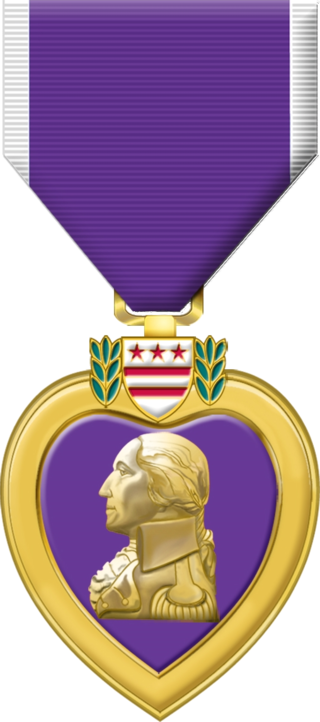
The Purple Heart (PH) is a United States military decoration awarded in the name of the president to those wounded or killed while serving, on or after 5 April 1917, with the U.S. military. With its forerunner, the Badge of Military Merit, which took the form of a heart made of purple cloth, the Purple Heart is the oldest military award still given to U.S. military members. The National Purple Heart Hall of Honor is located in New Windsor, New York.
The Commendation Medal is a mid-level United States military decoration presented for sustained acts of heroism or meritorious service. Each branch of the United States Armed Forces issues its own version of the Commendation Medal, with a fifth version existing for acts of joint military service performed under the Department of Defense.

The Navy and Marine Corps Medal is the highest non-combat decoration awarded for heroism by the United States Department of the Navy to members of the United States Navy and United States Marine Corps. The medal was established by an act of Congress on 7 August 1942, and is authorized under 10 U.S.C. § 6246.

The Meritorious Service Medal (MSM) is a military award presented to members of the United States Armed Forces who distinguish themselves with outstanding meritorious achievement or service to the United States.

George Brainard Crist was a four-star general of the United States Marine Corps and was the first Marine to be designated as a Unified Commander, serving as Commander in Chief of the United States Central Command from 1985 to 1988.

Daniel Joseph Daly was a United States Marine and one of nineteen U.S. servicemen to have been awarded the Medal of Honor twice. Daly and Major General Smedley Butler are the only Marines who earned two Medals of Honor for two separate acts of valor.
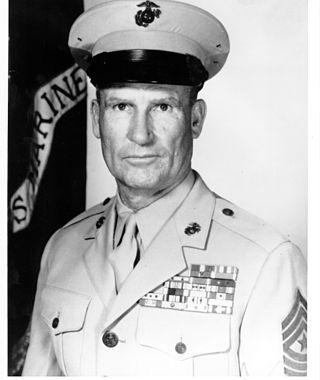
Joseph W. Dailey was a United States Marine who served as the 5th sergeant major of the Marine Corps from August 1, 1969, until he retired from active duty on January 31, 1973. Dailey was the oldest living former sergeant major of the Marine Corps when he died in 2007. Dailey served in combat in three wars—World War II, the Korean War, and the Vietnam War—earning the Silver Star for actions during the Battle of Okinawa and the Navy Cross and the Bronze Star Medal for heroism in Korea. He was a member of the Church of Jesus Christ of Latter-day Saints.
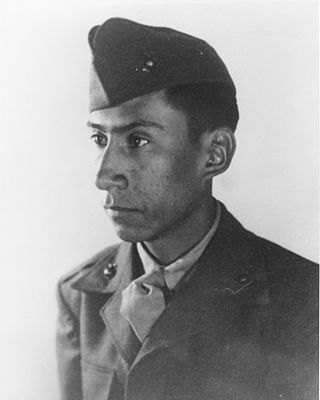
Staff Sergeant Ambrosio Guillen was a United States Marine who was posthumously awarded the Medal of Honor—the United States' highest military award for valor—for his heroic actions and sacrifice of life on July 25, 1953, two days before the ceasefire, during the Korean War. He was responsible for his infantry platoon's turning an overwhelming enemy attack into a defeat and disorderly retreat.
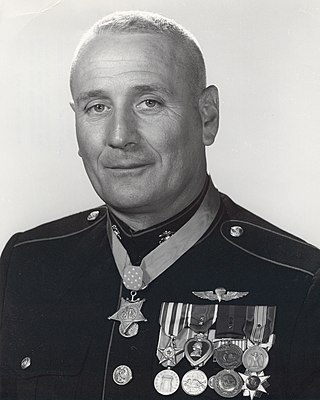
Jimmie Earl Howard was a Marine Corps staff sergeant when he led an eighteen-man reconnaissance patrol in a fierce battle against a battalion of Viet Cong in June 1966. As a result of his heroic actions, Howard became the sixth U.S. Marine to be awarded the nation's highest honor for heroism in combat in Vietnam. The Medal of Honor was presented by President Lyndon B. Johnson in White House ceremonies on August 21, 1967.

Angela Salinas is a retired major general in the United States Marine Corps. She was the first woman to command a Marine Corps Recruit Depot, and the first Hispanic woman to become a general in the Marines.
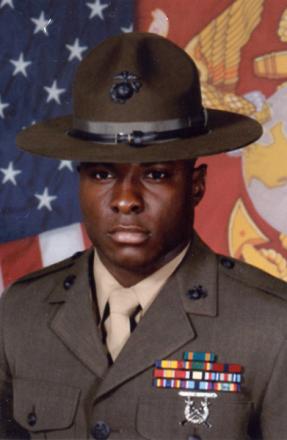
Aubrey Leon McDade Jr. is a retired United States Marine who was awarded the Navy Cross for his actions in the Iraq War, in which he rescued two U.S. Marines during an enemy ambush during the Second Battle of Fallujah, in November 2004. He is the fifteenth U.S. Marine to receive the Navy Cross in the Global War on Terrorism.
A battlefield promotion is an advancement in military rank that occurs while deployed in combat. A standard field promotion is advancement from current rank to the next higher rank; a "jump-step" promotion allows the recipient to advance by two ranks.
Hispanics in the United States Marine Corps, such as Private France Silva who during the Boxer Rebellion became the first Marine of the thirteen Marines of Latin American descent to be awarded the Medal of Honor, and Private First Class Guy Gabaldon who is credited with capturing over 1,000 enemy soldiers and civilians during World War II, have distinguished themselves in combat. Hispanics have participated as members of the United States Marine Corps in the Boxer Rebellion, World War I, the American intervention in Latin America also known as the Banana Wars, World War II, the Korean War, the Vietnam War, the Gulf War and most recently in the military campaigns of Afghanistan and Iraq.
Diana Marie Munz, later known by her married name Diana DePetro, is an American former competition swimmer and Olympic champion from Moreland Hills, Ohio. She represented the United States at the 2000 Summer Olympics in Sydney, Australia, where she won a gold medal in the women's 4×200-meter freestyle relay and a silver medal in 400-meter freestyle. Four years later at the 2004 Athens Olympics she added a bronze medal in the 800-meter freestyle to her Olympic medal collection. She has 3 daughters; Sydney, Her song, Reogun, and Penelope.
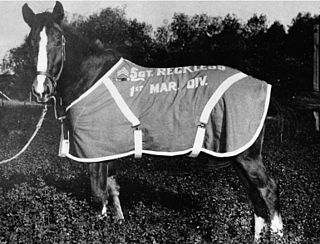
Staff Sergeant Reckless, a decorated warhorse who held official rank in the United States military, was a mare of Mongolian horse breeding. Out of a racehorse dam, she was purchased in October 1952 for $250 from a Korean stableboy at the Seoul racetrack who needed money to buy an artificial leg for his sister. Reckless was bought by members of the United States Marine Corps and trained to be a pack horse for the Recoilless Rifle Platoon, Anti-Tank Company, 5th Marine Regiment, 1st Marine Division. She quickly became part of the unit and was allowed to roam freely through camp, entering the Marines' tents, where she would sleep on cold nights, and was known for her willingness to eat nearly anything, including scrambled eggs, beer, Coca-Cola and, once, about $30 worth of poker chips.

James Phillips Berkeley was an officer of the United States Marine Corps who attained the rank of lieutenant general. He is most noted as Signal Officer of 5th Marine Division during the Battle of Iwo Jima and later as commanding general of Fleet Marine Force, Atlantic. He was the son of Medal of Honor recipient, Major General Randolph C. Berkeley.














